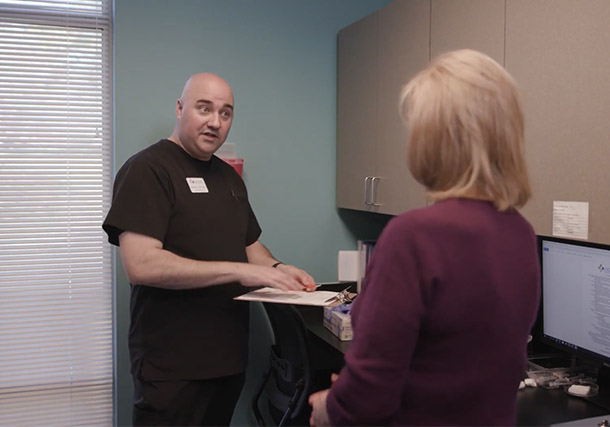
Treatment for Primary Immunodeficiency Disease (PIDDs) in Charlotte
A primary immunodeficiency disease can be a frustrating and difficult condition for many individuals. At Carolina Asthma & Allergy Center, we understand the impact that PIDDs can have on your lifestyle and well-being, and we are committed to providing comprehensive care to help manage and treat these conditions.
Our team of board-certified allergists and experienced healthcare professionals is dedicated to providing personalized treatment plans and ongoing support to help you live your life to the fullest. Whether you are seeking a diagnosis, treatment, or ongoing management of your PIDD so you can find relief from your symptoms, we are here to help you every step of the way.
How to Request an Appointment
At Carolina Asthma and Allergy Center, we offer comprehensive evaluation and treatment for your PIDDs. If you suspect you may have a PIDD or have noticed symptoms that may be related to your immune system, you can request an appointment with our team of board-certified allergists and experienced healthcare professionals.
To schedule an appointment, you can call our office or fill out the online appointment request form on our website. Our friendly staff will work with you to find a convenient date and time for your visit.
During your appointment, our Charlotte allergists will review your medical history, perform a physical exam, and conduct any necessary tests to determine if you have a PIDD. Based on your evaluation, our team will develop a personalized treatment plan to help manage your symptoms.
What is Primary Immunodeficiency Disease?
Patients with Primary Immunodeficiency Disease (PIDD) are highly susceptible to infection because their immune systems are either not working properly or are missing key functions.
PIDDs include a wide range of disorders that affect normal immune function. Due to genetic defects, the effectiveness of certain proteins and antibodies in the immune system fail. Because PIDDs are typically genetically passed down, they’re not contagious. Often PIDDs are identified in infancy, though others may emerge in adulthood.
A common red flag of a PIDD is recurring, severe and difficult to treat infections, including sinus, throat, ear, lungs, brain, skin, urinary tract, or gastrointestinal infections.

What are the Symptoms of PIDDs?
PIDDs are characterized by recurring, severe and difficult to treat infections, including bronchitis, pneumonia, ear infections, sinusitis, meningitis, and skin infections. If you have a family history of PIDD, you should be especially attentive to symptoms including:
- Need multiple courses of antibiotics to clear up infections
- Regularly require IV therapy for infections
- Three or more serious infections within a year
- Swollen lymph nodes
- Enlarged spleen
- Recurring skin or organ abscesses
- Digestive issues such as chronic diarrhea, camping, nausea and loss of appetite
- Weight loss
- Failure for infants to gain weight
- Persistent thrush in mouth for infants
- Delayed growth in children
Types of PIDDs
There many known types of PIDDs, all of which impact immune function. Many of these disorders are extremely rare, while others occur more frequently. Here are some types of PIDDs you should know about:
Chronic Granulomatous Disease (CGD)
Chronic granulomatous disease (CGD) occurs when white blood cells are unable to fight off certain bacteria and fungi. Due to gene mutations, these cells can’t produce hydrogen peroxide to eliminate infection.
Common Variable Immune Deficiency (CVID)
Common variable immune deficiency (CVID) involves having low antibody levels, causing high susceptibility to bacterial and viral infections. Antibodies such as IgG, IgM and IgA are typically impacted.
Specific/Selective Antibody Deficiency
Selective IgA deficiency involves the absence of IgA in the body. It’s the most common PIDD today. Patients who lack IgA are prone to infections in the mouth and sinuses, lungs and digestive tract.
Selective IgA Deficiency
Selective IgA deficiency involves the absence of IgA in the body. It’s the most common PIDD today. Patients who lack IgA are prone to infections in the mouth and sinuses, lungs and digestive tract.
X-Linked Agammaglobulinemia (XLA)
X-linked agammaglobulinemia (XLA), also known as Bruton’s, arises from an error in the gene called Bruton’s tyrosine kinase (BTK). As a result, the body doesn’t have healthy B cells to produce antibodies for defending against infection. Strep and staph infections are especially common with Bruton’s.
DiGeorge Syndrome
DiGeorge Syndrome is characterized by low production of T cells, which help build a body’s autoimmunity. This occurs due to abnormal cell and tissue development, impacting the thymus where T cells learn how to fight off infection. DiGeorge Syndrome impacts other areas of the body too, including facial traits, thyroid function, and heart defects.
Severe Combined Immunodeficiency (SCID)
Severe combined immunodeficiency (SCID) is an extremely serious PIDD that arises in newborns due to poorly developed T cells. Testing for SCID is typically part of the newborn screening panel. Often newborns will require stem cell transplant within months in order to survive.
How are PIDDs Diagnosed?
Diagnosing PIDDs can be difficult because there are hundreds of types, many of which are rare. It’s common for non-specialists to confuse symptoms with allergies or asthma, leading to a misdiagnosis.
That’s why it’s essential to schedule an appointment with an expert allergist or immunologist who can correctly identify a PIDD and ensure you get the care you need. Early diagnosis of PIDD is ideal, as treatment can potentially slow down the disorder and prevent infections in the in the future.
To diagnose a PIDD, an immunologist will take a thorough look at your medical history, including the frequency and severity of past infections. In addition, you’ll be asked about your family’s health history, such as any PIDDs or deaths by unexplained illness.
Immune Function Testing
If a PIDD is suspected, the doctor will perform immune function testing. This typically involves a blood test to check your immunoglobulin levels, white blood cell counts, and responses to previous vaccinations.
Depending on the suspected PIDD, a panel of specific tests will be ordered to pinpoint the diagnosis. Genetic tests may also be used to confirm the presence of gene mutations.
Treatment for PIDDs in Charlotte
Once diagnosed with PIDD, your allergist or immunologist will create a personalized care plan, including treatments to improve immune function and prevent infection, including:
- Immunoglobulin replacement therapy (to boost immunoglobulin levels)
- Immunomodulation therapy, such as gamma interferon (to target the immune system for function improvement)
- Gene therapy (to fix mutations in specific faulty genes)
- Stem cell transplant (to transfer healthy stem cells into the body)
To fight current infections, a doctor may prescribe long-term antibiotics, antivirals, antifungals or other timely medications. General strategies to prevent infections will also be discussed.
Summary
At Carolina Asthma and Allergy Center, we are dedicated to providing compassionate care and ongoing support to help you live your life to the fullest. Contact us today to request an appointment and take the first step towards managing your PIDDs.
PIDDs FAQs
Is PIDD hereditary?
Most cases of PIDD are hereditary. Because genetic errors or mutations are responsible for PIDD, it’s usually inherited from the genes of one or both parents.
Can PIDD be prevented?
No, PIDD can’t be prevented as it’s a genetic disorder. However, patients with PIDD can try to prevent getting infections by avoiding exposure and undergoing therapies to improve immune function.
Are allergies an immunodeficiency?
Allergies and immunodeficiency disorders may present similar symptoms. However, the body’s response is fundamentally different. With allergies, your immune system overreacts to a harmless substance, causing symptoms. With immunodeficiency, your immune function is absent or not working properly due to genetic defects. This leaves your body vulnerable to infection, leading to similar symptoms as allergies. Links between allergies and immunodeficiency are currently being studied. It’s possible for patients to experience allergy symptoms that are actually an underlying immunodeficiency disorder. However, most allergies aren’t the result of an immunodeficiency.



